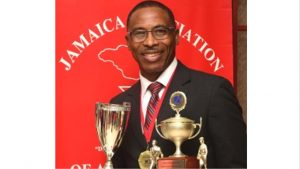
Dean of the Faculty of the Built Environment at the University of Technology, Jamaica, Associate Professor Dr Garfield Young, was named Boss of the Year 2017 by the Jamaica Association of Administrative Professionals yesterday.
Jamaica’s newly minted Boss of the Year got the nod for the award yesterday in part by arguing that Government needs to come to terms with research that marijuana has a wide range of value outside of smoking, and should therefore encourage wide-scale farming of the herb.
In a five-minute presentation on the topic ‘Successive governments have failed to propel Jamaica to the forefront of the emerging cannabis industry’, dean of the Faculty of Built Environment at the University of Technology, Jamaica Dr Garfield Young said he agreed that governments have failed to “recognise or tap into the island’s flora, fauna, our people, and all that we have that has been naturally given to us by God”.
“We like to talk about ganja, but there is a cannabis industry that this country and this Government are [belatedly] beginning to recognise that it has value to us as a people,” Young said.
“I understand it personally; it’s not just about smoking and getting high. Really, there is a significant medicinal value that requires proper research, proper investment, [and] a clear understanding by government that it is a gift to us.
“It offers way more than you’ll see elsewhere,” he continued, adding that if government compared ganja grown in Jamaica to that of other countries it would appreciate that home-grown ganja is of a higher quality and standard.
The Amendments to the Dangerous Drugs Act, passed in 2015, created the framework for the decriminalisation of offences under the Act, making it a ticketable offence to possess less than two ounces of ganja. This reduced it to a minor offence and also created the framework for the development of legal medical marijuana, hemp and nutraceutical industries.
Government said then that it was not the intention to legalise the herb, because Jamaica’s obligations under international law do not currently allow for the full legalisation, trade and export.
But Young, an associate professor, believes the move is short-sighted.
He stated that, among its many uses, ganja has value in the building industry, and said it would be ideal as an alternative material in construction.
“I would strongly support way more investment in this area, not only in higher education, but an opening up to our farmers so that they can be encouraged to grow the herb. I am for progressive Jamaica…the Government needs to recognise the value,” he argued.
Canada-based Timeless Herbal Care Limited in 2015 projected that Jamaica stands to benefit from a US$100-million deal to develop medical marijuana products here for the international market over the next 10 years.
A release published by NetworkNewsWire in February revealed that the cannabis industry in the US, buoyed by an estimated US$7 billion in transactions last year, is lobbying for the removal of ganja from the list of Schedule I drugs, which includes heroin, ecstasy and LSD.
According to the release, the industry has been described as the fastest growing in America in recent years, with 28 states having so far legalised marijuana for medical and/or recreational purposes.
Similarly, Israeli ministers in February endorsed a draft bill to legalise export of ganja for approved medical use.
Young was speaking at the Jamaica Association of Administrative Professionals’ Boss of the Year and Administrative Professional of the Year award ceremony staged at Knutsford Court Hotel.
